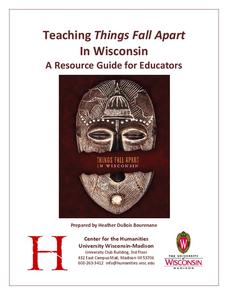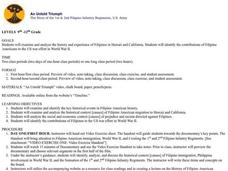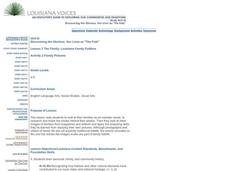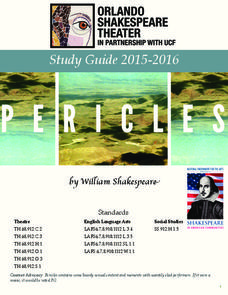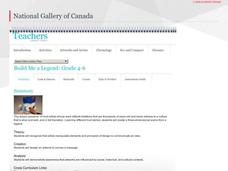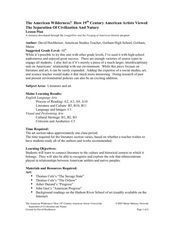University of Wisconsin
Teaching Things Fall Apart in Wisconsin: A Resource Guide for Educators
“There is no story that is not true, . . .” And uncovering the truths in Things Fall Apart is the focus of a 68-page resource packet designed to provide instructors with a wealth of materials that enhance understanding of Chinua Achebe’s...
Captain Planet Foundation
George Washington Carver and the Sweet Potato
Learn about George Washington Carver's important contributions to agriculture by studying the sweet potato. First graders read about the inventor's observations and prepare sweet potato slips for the class garden. Additionally, they...
Curated OER
An Untold Triumph
High schoolers examine and analyze the history and experience of Filipinos in Hawaii and California. They identify the contributions of Filipino Americans to the US war effort in World War II, and analyze the many causes that led to...
Curated OER
Bambara's The Lesson
Twelfth graders read the short story The Lesson. They research the socio-economic and cultural context of the story and author. They examine the author's point of view. They analyze the first person narration in the story. They rewrite...
Curated OER
Jazz in America Lesson Plan 6
Students survey bebop, cool jazz, and hard bop. They explore how bebop, cool jazz, and hard bop reflected American culture and society in the 1940s and 1950s.
Curated OER
"Shooting An Elephant": George Orwell's Essay on His Life in Burma
High school readers examine George Orwell's essay "Shooting an Elephant" for examples of symbolism, metaphor, connotation, and irony. They analyze how these literary tools convey the writer's main point and contribute to the persuasive...
Curated OER
Revolutionary News Network
Seventh graders study events leading to, during and resulting from the American Revolution. They review elements of a political cartoon. They create and dramatize a scene from a Revolutionary War novel.
Curated OER
Henry Wadsworth Longfellow's Christmas Bells
Students read and analyze the anti-slavery poem, "Christmas Bells" by Henry Wadsworth Longfellow. They discuss the content and form of the poem, write an essay, write an original poem, examine how this anti-slavery poem was converted...
Museum of Modern Art
Modern Art and Ideas
The Museum of Modern Art provides this educators' guide to Dada and Surrealism. Featuring the works of such artists as Jean Arp, Salvador Dali, Joan Miro, and Meret Oppenheim among others, the guide is ideal for art history and...
Curated OER
The Family: Louisiana Family Folklore
Every family has a different story to share. Your learning community examines the checklist that applies to the lesson plan, share some of the teacher's family photos, and look for clues in their own family photos in order to complete a...
Curated OER
Beware the Ides of March
Sixth graders pretend to be the oracle warning Caesar about March 15th. They write a letter to Julius Caesar warning him of the consequences of going to the Senate building on March 15th. Students identify three causes and effects that...
Curated OER
What's in the Time Capsule? A Technology-Connected Lesson Plan
Twelfth graders use computers and the Internet to research a specified area, word processors to prepare an essay, a digital camera, a video camera gather visuals, and a scanner to add visuals to a PowerPoint presentation as they discover...
US National Library of Medicine
Drug Use and Abuse: Past and Present
Pick your poison: tobacco, alcohol, opiates, cocaine, or marijuana. An online exhibition launches a research project that asks groups to select one of the five drugs and gather information on how the use of the drug and the regulations...
Orlando Shakes
Henry V: Study Guide
Shakespeare did more than write timeless literary works—he coined words such as moonbeam, fortune-teller, and even eyeball! A study guide for Henry V introduces key words the Bard first used with a fun vocabulary activity, part of a...
Orlando Shakes
Pericles: Study Guide
Everyone loves a great riddle, right? Everyone except for the characters in Shakespeare's Pericles, who will be killed unless they answer the king's riddle correctly. With the study guide, scholars use words coined by Shakespeare to play...
National Gallery of Canada
Build Me a Legend
Legends are full of imagery and action. Transfer a scene from a legend to a three-dimensional art piece. Class members first view Inuit art and discuss legends. They then build scenes that include action, setting, and characters.
National Gallery of Canada
Build a City of the Future!
Tap into your pupils' imagination by asking them to design futuristic, ideal cities. They must discuss and take scale and size into account, looking at some model pieces of art for inspiration and analysis. The final product for each...
Orlando Shakes
Les Misérables: Study Guide
A writer has the responsibility to defend the less fortunate members of society. At least that was the view of Victor Hugo, author of Les Miserables. The novel is the subject of a study guide from Orlando Shakespeare Theater. Learners...
National Endowment for the Humanities
Tales of the Supernatural
Scary stuff! Whether approached as the first horror story or a "serious imaginative exploration of the human condition," Frankenstein continues to engage readers. Here's a packet of activities that uses Mary Shelley's gothic novel to...
Curated OER
The American Wilderness? How 19th Century American Artists Viewed the Separation of Civilization and Nature
The attitudes of European settlers toward the American wilderness, as reflected in art and literature, is the focus of this resource packet designed for teachers. Included in the unit overview you will find lists or paintings and works...
Curated OER
Jacksonian America and the Indian Removal Act of 1830
Students utilize primary sources to explore the national climate concerning Native American Indians during the Andrew Jackson administration. They are presented with opinions for and against the Indian Removial Act of 1830 as they...
Curated OER
First Meeting of the Indians and the Europeans
Your class hears a Native American Indian point of view of Europeans' arrival in Louisiana. They assess how cultural perspectives (especially an insider's view) and native language can shape a story. Each pupil identifies the...
National Gallery of Canada
Reading Symbols
Introduce your upper-elementary students to printmaking. Class members view prints, select and research symbols in a piece, and create their own sets of prints using styrofoam trays. Pupils can wash off the paint on their trays to make...
National Gallery of Canada
The Roots of My Family
Represent family history visually by requiring your young artists to create family trees that express balance and symmetry. Pupils examine works of art, research their family histories, and put together large family tree posters.


